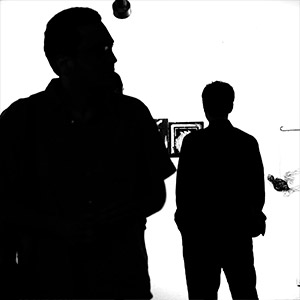The aim of the module Painting, through theoretical and practical work, is to educate independent fine art artists and fine art educators as complex and free artistic personalities, socially responsible, able to independently engage in artistic endeavours. The goal is also to prepare academic professionals for responsible and creative engagement in the teaching of fine art culture in elementary schools and high schools.
The teaching programme of the module Painting enables an analytical approach to conventional and current painting motifs, research in the framework of the medium of painting with the use of traditional and modern painting materials, as well as experimental work, the advancement of creative thought and aesthetic criteria, development of ideas and operative techniques of their realisation, the evolution of creative freedom and fostering of individual expression.
After completing their studies, students are qualified for individual artistic work, they are able to apply theoretical knowledge and skills in their work and master the methodology of research. They are also qualified to actively participate in, or manage interdisciplinary research and artistic teams in cultural institutions.
By completing Master studies with at least 60 ECTS, the student receives an academic title Master in Fine Arts.
The module Sculpture enables the mastering of practical technical, technological, and theoretical aspects of sculpture through the development of creative abilities. The students’ investigative spirit and experimental work is developed during their studies, which further lays a foundation for personal creative expression. The programme further facilitates the forming of academic professionals that can responsibly and inventively engage in the teaching process of fine art culture in institutions of elementary and high school education. In the first part of the studies attention is directed towards the modalities of analytical dealings with, primarily, the human figure and related themes, starting with a live model, which further helps develop visual perception and the vocabulary of sculpture terminology. In the following phase, the emphasis is on the research of sculptural forms in correlation with the expressive potential of traditional and contemporary materials, developing of creative thought and the ability of abstraction and visualisation. The final phase of studies is directed towards experimental work of a selective nature, the evolving of ideas and techniques on the basis of the consideration of creative freedoms and fostering individual expression.
By completing Master studies with at least 60 ECTS, the student receives an academic title Master in Fine Arts.
The module Graphics aims at enabling a creative personality for all activities necessary for independent creative work in artistic practice and dedicated pedagogical work in primary and secondary schools. The learning outcome of the module Graphics is a broad knowledge of the historical, theoretical and practical aspects of graphic art development, the place and the role of the graphic medium in contemporary context, mastering the knowledge, skills and technical methods in pursuing one’s own fine art expression, knowing the pedagogical fine art theories and pedagogical fine arts practice in primary and secondary schools.
By using numerous media particularities of classical knowledge in a modern context, the students at the same time acquire skills and competences that enable wider media expression through a number of artistic and professional subjects as well as the application of knowledge from theoretical subjects – all for the purpose of producing a work of art that advances their field. The aim of the study programme of module Graphics is also the opportunity to conduct professional activity in a wider cultural context. These students could therefore be curators of modern galleries, administrators of fine art gallery programmes, managers of large professional art studios and leaders of courses in fine arts intended for a broader audience.
By completing Master studies with at least 60 ECTS, the student receives an academic title Master in Fine Arts.
The aim of the module in New Media Art is to train, through theoretical and practical work, independent fine art artists and fine arts educators as complex and free artistic personalities. The study outcome is an expert with academic background who, apart from the newly acquired knowledge in the field of New Media Art, has the basis for further education.
The teaching programme within the module New Media Art aims at educating students as professionals in their area of expertise. Students who receive such education are able to contribute to the overall cultural landscape and, more particularly, to the field of fine arts by working competently and independently. They are also equipped to actively and freely cooperate in as well as lead interdisciplinary research and artistic teams in cultural institutions and have the capacity to apply theoretical knowledge and skills in their work. Apart from this, students have teaching expertise for general and professional education.
By completing Master studies with at least 60 ECTS, the student receives an academic title Master in Fine Arts.
The aim of the module Photography is to educate students to become experts in their own field. Students with this type of education can competently and independently contribute through their work to the development of the cultural aspect of the medium of photography and art. They are equipped to actively and freely cooperate in as well as lead interdisciplinary research and artistic teams in cultural institutions and have the capacity to apply theoretical knowledge and skills in their work. The programme within Undergraduate studies involves four years of study and within Master studies – one year of study.
This module fosters different approaches to photography and each year is dedicated to a different topic and photographic technique. Ranging from documentary, coverage, still life studio, portrait, directed or constructed photography, the programme focuses on theoretical processing of contemporary tendencies in photography (media). Apart from the lectures, the methodology of the programme includes dialogical exchange, group and individual consultations and a large number of extra-curricular activities such as exhibitions, biennials, international projects, workshops, etc.
After the completion of their studies, students are ready for independent artistic work and have general and advanced professional and theoretical knowledge in the field of photography. They are aware of artistic trends in the world and have mastered the methodology of research work. Apart from that, students have pedagogical competences for working in primary and secondary education.
By completing Master studies with at least 60 ECTS, the student receives an academic title Master in Fine Arts.
The module Drawing within Master studies aims at providing creative environment in which students, after the completion of their Undergraduate studies, can develop their individual creative potential and their own unique expression in drawing.
The aim of this module is to learn students how to apply the acquired knowledge at a more complex task; to develop the ability to unite different aspects of their research work within the final model so they can more delicately define their personal artistic expression in the times in which they create. This process will be made possible by working on their individual projects, by examining expressive features of drawings, its hidden dimensions and boundaries as well as establishing new language possibilities through the means of merging drawing with other artistic forms.
This programme provides an intellectual environment, sources of information and guidance within which students can continue developing their individual poetics, critical awareness as well as the insights into intellectual and cultural context of their drawing research and art in general.
The aim of this teaching programme is the education and training of students through theoretical and practical work, enabling them for independent art work, for work within art pedagogy and cultural institutions. After the completion of the Master studies, the students become highly competent and qualified experts both in practice and theory of the drawing and other related fine art disciplines and are able to engage in artistic endeavours. They also acquire broad knowledge of artistic trends at home and abroad, master the methodology of research, are able to manage the interdisciplinary research as well as the artistic teams or institutions of culture and give lectures at colleges, academies and faculties.
By completing Master studies with at least 60 ECTS, the student receives an academic title Master in Fine Arts.
The aim of the programme Graphic Design is to educate students, through theoretical and practical work, to become independent fine artists of applied arts (Graphic Designers) and to prepare future academic experts for responsible and creative teaching of fine arts in primary and secondary schools.
The aim of this module is to educate experts whose profile and professional activity are to contribute to the development of the overall cultural landscape and, more particularly, to the field of applied arts that this programme covers. Through theoretical and practical work within the subjects of graphic design field, such as poster, book graphics, utilitarian graphics, script and typography, students are prepared to become independent applied artists.
By completing Master studies with at least 60 ECTS, the student receives an academic title Master in Fine Arts.
The Academy of Arts in Novi Sad has always been recognised as a place fostering illustration as a special aspect of artistic expression. Some of our former students have had the highest achievements in this field.
Since 2016 Illustration was established as a separate module within study programme Applied Arts and Design. Thus, the students who are solely interested in illustration and concept design are given the opportunity to focus all of their attention particularly to those fields. Within this module, students also have one course in graphic design so they can better understand the context in which their work is applied.
The aim of the module Illustration is to enable students to adopt theoretical and professional knowledge necessary for professional and creative work in the field of narrative illustration in books as well as editorials and conceptual illustrations, comics, concept design including traditional and digital illustration techniques.
Concept design is today a very popular field which implies the design of the characters and the environment for the animation, films and video games. Having this knowledge will give the students the possibility to find a job in gaming industry which is becoming more and more popular in our country and especially abroad.
Since the illustration belongs to applied arts field, it will be considered as a promising profession as long as there are publishing, advertising and entertainment industry (video games, animated films, smart phone applications etc.).
The programme of Interior Design at the Academy of Arts in Novi Sad is an accredited study programme in the field of Applied Arts and Design.
The programme of the module Interior Design implies professional and creative work on interior design of residential houses, apartments, public and business spaces, adaptations, reconstructions and remodelling of the existing buildings, urban design and design of one-of-the kind industrial furniture. In addition to these basic disciplines, the scope of work is extended to the area of scenography, light design, exhibition design including exhibition spaces and interdisciplinary projects that comprise fine arts and architecture, art in public space and other.
The programme is multidisciplinary and offers theoretical knowledge in history, theory of fine arts and applied arts, social sciences and humanities.
The specific professional teaching programme is based on project tasks followed by theoretical lectures on: the shape versus space relationship, materialisation of architectural objects, sustainable and energy efficient materials, the social role of design and its position within culture and contemporary art etc.
Upon completion of the studies, the students are enabled to work independently in design and architectural studios, cultural institutions, within their own work or they can continue their education within the third cycle of academic studies (Doctoral studies).
New Master study programme Conservation and Restoration of the Works of Fine and Applied Arts (two year programme) is currently opening its doors to the first generation of students in the academic year 2017/2018.
The aim of this study programme is the education and training of experts in the field of conservation and restoration who can understand the flows of history, theory and philosophy of the protection of the cultural heritage and who have various types of knowledge in the field of art, social sciences and humanities, natural sciences and technology. Furthermore, they are able to plan and perform the conservation and restoration treatment, cooperate with the experts in similar fields and have critical awareness of the processes of protection and presentation of cultural heritage including the role of a conservator-restorer during that process.
To be a conserver-restorer, it is required to have a combination of academic knowledge and practical skills. In order to achieve this, the mandatory part of the study programme requires well-balanced teaching of theory and philosophy of the protection of cultural heritage, art techniques and materials, methods and techniques of conservation and natural sciences applied in conservation. Through this, students acquire advanced knowledge but also obtain certain breadth in perceiving the field of cultural heritage. By choosing elective courses, the students are guided towards the specific artistic techniques and the problems within conservation, while through their participation in projects on conservation they acquire the needed experience and skills.
The programme is designed through the cooperation of the Academy of Arts in Novi Sad, Faculty of Sciences in Novi Sad, Matica srpska Gallery and the Provincial Institute for the Protection of Cultural Monuments and gives a special emphasis on contemporary, multidisciplinary and team work.
Upon the completion of Master studies with 120 ECTS, the student receives an academic title of Master in Conservation and Restoration.





